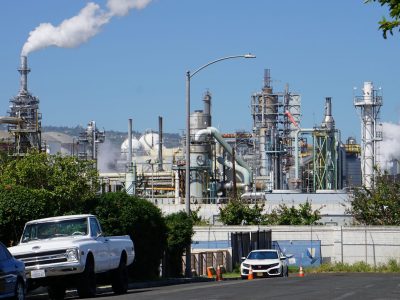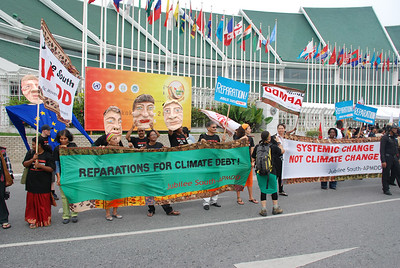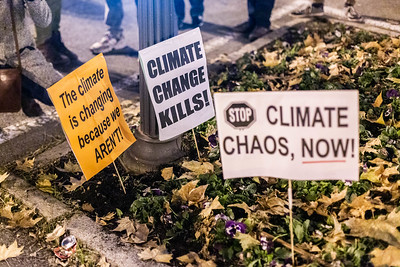An Oil and Gas Setback in Los Angeles Would Not Create Billions in Liability
A recent report from the Petroleum Administrator relied on incorrect and incomplete legal assumptions about the City's potential liability to oil and gas operators. Here's why it matters.
This week, Sean Hecht and I (in our capacity as attorneys in the Frank G. Wells Environmental Law Clinic at UCLA School of Law) sent a letter on behalf of the Los Angeles Neighborhood Land Trust to Mayor Eric Garcetti, the Los Angeles City Attorney's office, and the Los Angeles City Council. (Our letter built off of a similar one sent by attorneys with the NRDC, Communities for a Better Environment, and the Center for Biological Diversity, which we attached to our letter...
CONTINUE READINGNetherlands’ Supreme Court Demands More Emissions Cuts
However, today's ruling will likely have little direct impact
Today the Netherlands' supreme court sided with an environmental organization and ruled that the Dutch government has an obligation to reduce greenhouse gas emissions more aggressively. This is being widely praised by environmentalists and others concerned about climate change. However, this historic ruling will likely have little impact on actual emissions, at least directly. At the same time, its legal logic might have long term consequences across Europe. As ...
CONTINUE READINGPost-Madrid, China And California Have An Opportunity To Lead
As international climate action falters, the two climate leaders can fill the void
Note: this post is co-authored with Fan Dai, director of the University of California’s California-China Climate Institute. With the high-profile failure of last week’s UN climate conference in Madrid, the focus of international action on climate change will need to shift to political leaders of key global economies. We attended the conference in Madrid on behalf of the UC California-China Climate Institute and the Center for Law, Energy and the Environment (C...
CONTINUE READINGGuest Blogger Divya Rao: Confronting Reality: A Lack of Accountability at COP25
The Support of Toyota and Other Manufacturers for the Trump Administration's Policy Rollbacks Shows the Need to Confront Corporate Decisionmaking on Energy and Climate
As Cara Horowitz and Idalmis Vaquero discussed in their blog posts, the true highlight of COP 25 has been the numerous youth and indigenous interventions, actions, and disruptions. After spending four days at the COP, I came away from the events surprised by the level of corporate visibility and greenwashing in the side events, but also impressed by the activists asking corporate panelists sharp and insightful questions to try and hold them accountable. At one poi...
CONTINUE READINGThe Decade in Review
Like many humans, the Twenty-First Century’s teenage years were stormy.
“It was the best of times; it was the worst of times.” That pretty much sums up the ten years from January 2010 to January 2020. As the decade began, Barrack Obama was in the White House and the Democrats controlled Congress but were one vote short of a filibuster-proof majority in the House. Under Nancy Pelosi’s leadership, the Waxman-Markey bill had passed the House, but it never made it to a vote in the Senate. When the Democratic majority in the House ...
CONTINUE READINGCOP-Out 25: Why Madrid’s Failure May Not Really Matter
Carbon markets are unlikely to be central to global decarbonization efforts
The 25th United Nations Conference of the Parties (COP) in Madrid ended largely in failure on Sunday, with the parties unable to come to agreement on provisions governing a potential international carbon market. How big a deal is that failure? Like my UCLA Law colleagues, I attended the conference in Madrid and witnessed similar dynamics that they described. I’ve been a skeptic of these UN processes since as long as I’ve worked in the climate field. On one hand, the...
CONTINUE READINGCOP25 in Context, or “How Bad is It?”
Reflections on Stopping Speeding Locomotives and Falling Off Cliffs
In my last post, I sketched a few of the many intense tensions and contradictions swirling around this year’s Conference of the Parties (COP25) to the UN Framework Convention on Climate Change (FCCC). In this post, I’ll try to make some sense of the biggest tension of all, one that folks working on climate are asked about all the time – how to characterize the overall prospects for human welfare in the face of climate change. How bad is it? Is this our last cha...
CONTINUE READINGDisorientation, Rage, Despair – and Hope? The Contradictions of COP25
Personal Notes on the Conference of the Parties in Madrid
As you’ve seen from several recent posts (and more to come), the UCLA Law Emmett Institute has had an observer delegation – as we do every few years – at the 25th annual Conference of the Parties (COP25) to the Framework Convention on Climate Change (FCCC). I’ve been there with faculty colleagues Cara Horowitz and Alex Wang, Emmett fellow Siyi Shen, and students Tom Callahan, Divya Rao, and Idalmis Vaquero. I’ll be doing a few posts on what happened – and ...
CONTINUE READINGBoJo versus Trump on Climate
Why is the GOP such an outlier on climate change?
Boris Johnson is like Trump in many ways, including a casual disregar for truth, but they’re not alike on climate change. Right after his victory, Johnson renewed his pledge to make the UK carbon-neutral by 2050. He called for “colossal new investments. . . to make this country the cleanest, greenest on earth, with the most far-reaching environmental programme.” Like Trump in 2016, Johnson enters office with firm control of the government, but with minority popu...
CONTINUE READINGGuest Blogger Tom Callahan: The Fallacy of Climate Choice
Promoting Positive Climate Choices at Every Level of Decision-making
One of the undercurrents of the negotiations at COP 25 in Madrid is the lack of leadership from the United States government after the decision to pull out of the Paris Agreement. While the formal decision-making process here only involves nations that are party to the agreement, there are numerous NGOs, business groups and other non-state parties that participate as observers by attending the COP and putting on side events. One of the most interesting parts of the C...
CONTINUE READING













